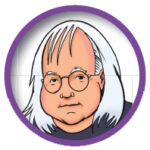
If there’s a lesson to be learned in studying the live event career of Malcolm Weldon (and there are many), it is that you should listen to your grandma. That he relented and made a call to a connection she made would be the beginnings of an extraordinary career. From that contact, he started out as a small-time audio engineer, placing him in a position to meet tour manager Marty Hom, who would hire him to be a stage manager for Paula Abdul. Today he is a sought-after production manager, and the list of artists he’s taken care of includes Aerosmith, Beyoncé, the Eagles, Prince, Tina Turner, Cher, Mariah Carey, Whitney Houston, Bette Midler, Janet Jackson, Eric Church, and finally, Pink.
“I remember like it was yesterday, as I was a young tour manager myself,” says Hom (Fleetwood Mac, Olivia Rodrigo). “I was taking artists to the Beverly Theater where Malcolm was the production manager and the sound guy — actually, I think he did everything there!” The young Weldon made an immediate impression. “I think one of my better qualities is defining talented crew members and getting them to come work with me — I can recognize great talent, and Malcolm was certainly one of those people. Right away I spotted his fire, desire, and passion.” Not only was he correct about Weldon, but among the many skills he would pass on to the young man was also the ability to spot and nurture talent, a key component to Weldon’s success.
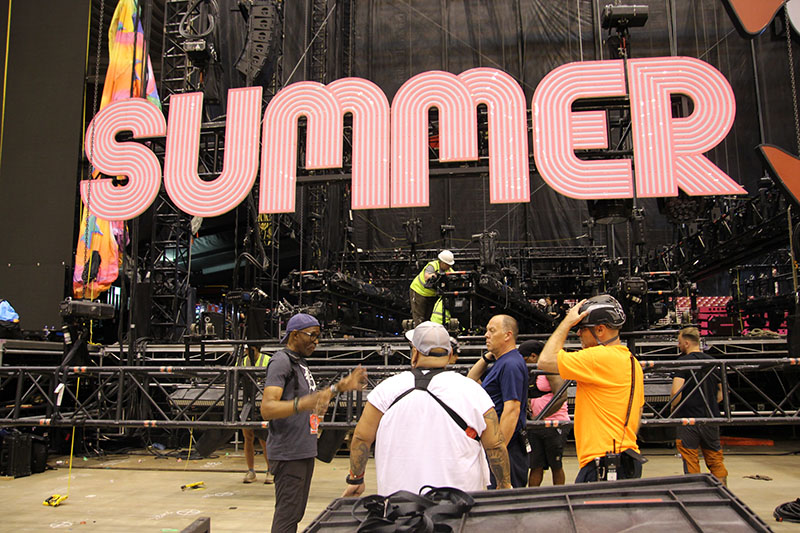
Grandma Ruff
Born in 1961, Weldon was raised in South Central L.A., and grew up in a household that “really loved the arts.” The gravitational pull of music was the strongest, especially jazz from masters like Chick Corea, Stanley Clark and Miles Davis. He even picked up the bass guitar, but “after a while, I realized I would never be that kind of player.” A prodigious reader of album liner notes learning all that went into making a recording, the teen set his sights on being a recording engineer.
One hitch: He had no idea how to do that. Once when scanning the Los Angeles Times’ Arts Calendar section, he spotted a small ad for Sound Master Recording Engineer School. “That opened the world to me, and I thought this is where I’m going to go.” Just 17 and out of high school, he was not deterred by the high cost of tuition for the school, which was almost $10,000 — a heady price for the late 1970s. “That was like a million dollars to me, but I worked and saved, and put myself through school working two jobs, including stocking shelves at a grocery store at night.”
Timing wasn’t on his side, though: By the time he graduated, the trend for artists to build their own studios in their home meant less work for commercial recording studios. “I went to every studio everywhere, saying I’d sweep the floors, anything, but there still wasn’t any work.”
Cue an exceptionally cool Grandma. “She got me my first professional gig and really started me in the business.” Sweetie Magnolia Ruff was a housekeeper and nanny for various families in the 1950s and 1960s, including for Stan Freberg. He was a comedian/writer/cartoon voiceover artist. Grandma Ruff encouraged him to call his daughter, Donna Freberg, who might be able to connect him to some work. “What’s this old Black lady know about recording engineering?” Weldon thought to himself. But he was browbeaten by Grandma, and he finally made that call to Donna, and a meeting with her husband ensued. See, Grandma knew Donna’s husband was Todd Fisher, son of singer Eddie Fisher and actress Debbie Reynolds. Todd Fisher was an ordained minister who had an audio engineering background himself when he founded Hiding Place Church, a growing house of worship organization.

A Prison Gig
Debbie Reynolds had a dance studio in North Hollywood that included a small recording studio called DR Studios, which Todd ran. They mostly did voiceover work there, but there was a mobile recording truck that was part of it as well. The Hiding Place Church had a partnership with PTL Club and supported them staging outside events. While doing live sound was off his radar, Weldon jumped at the chance when Fisher asked for help one weekend. “It was actually an outreach at Chino Prison, where they were doing a concert,” he says with a laugh. During load-in, a guard said to him, “If anything happens you need to get to this area and pull this lever.” You know, in case the prisoners riot, etc. It was a dramatic introduction to live events, indeed.
Fisher continued to give him small jobs, though he still needed to stock shelves at night. One job included getting to work on a Dick Clark special that was a battle of the bands, with the winner getting a recording contract. From there, Fisher’s team was hired to record one of the bands at Studio Instrumental Rentals (SIR) in L.A.
Meanwhile, the church was expanding and kept outgrowing facilities, leading them to needing a bigger, more appropriate place for their events and performances. “The Beverly Theater had been a full-on movie theater but hadn’t shown movies in years, and so they turned it into a live event venue,” Weldon says. After another PTL concert there, the Beverly’s technical director, Steve Schneider, saw that Weldon was in a big hurry to wrap things up. When Schneider learned he was rushing to get to his grocery store job, a talk ensued where Weldon told Schneider of his dreams of being a recording engineer and producer. Schneider made him an offer of what to do until that happens that was a little closer to his dreams than stocking shelves. So, in 1981, he became the theater’s sound engineer (and everything else), a gig he kept until the end of the decade.
There he worked with all kinds of artists, most who had their own FOH engineer so he would run monitors in addition to being the audio tech. He knew he had made the right choice when on his first night he ran monitors for one of his heroes, Chick Corea. “It was mind boggling — a dream come true!” The decade there exposed him to every genre as acts he worked with included Simple Minds, Devo, Miles Davis, George Winston — “it was very eclectic.” With all those different acts came all kinds of different production and tour managers, including Marty Hom. At the time, Hom was working his way up the live event career ladder, working with various acts at various stages of their development.

On the Road
One day when Hom was in the room, Weldon heard himself ask, “One of these days, why don’t you take me on the road?” The response was something like, “Sure, one of these days, kid.” Hom did return a few weeks later and told Weldon there might be some work for him on the Asian Pacific Festival. Now not exactly “on the road”— it was just across town in West L.A. at the Pan Pacific Park. Weldon knew it was something of a trial, and that Hom wanted to see how he would do “outside my element.”
Hom does indeed remember “testing” Weldon with that festival before considering taking him out on the road. “He passed with flying colors, and I felt Malcolm would be a great part of my team.” Next, Hom was putting together a tour of MTV stars. This traveling show was hosted by Downtown Julie Brown, featuring Tone Loc, Lisa Lisa, The Cult and The Jam. Most interesting to Weldon personally was the band Was (Not Was). “I was into them because they were real musicians.”
Much more significant was the headliner, a young Paula Abdul. “She was suddenly huge, and on every magazine cover.” The tour lasted six weeks and like hundreds of would-be touring professionals, he experienced a gig ending as abruptly as it had begun, leaving him to ask himself if he could build on this and have it continue. He did. Next was a tour with C&C Music Factory and then Milli Vanilli. And then Hom rang him again for Abdul’s first big tour Under My Spell in 1991.
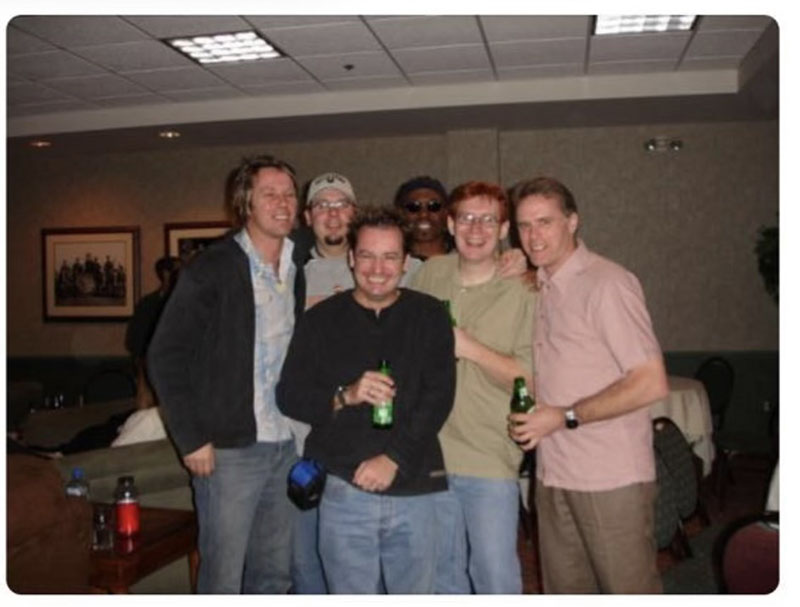
Spellbound
Weldon was thrust into the big league as Stage Manager on what would be his first international tour traveling North America, Australia, and Asia. “It was a 10-truck tour, which was big back then. And I remember one day thinking, ‘Oh man I don’t know if I can keep doing this’ — I was just so tired!” he laughs and adds: “Now I can do 10 trucks by myself!”
He knew then that if he wanted to be in the music business, he needed to fully commit and be creative about it. This included filling big gaps with smaller things, like jazz acts or whatever he could do from his L.A. base. The big gaps would shrink quickly as in 1994, Hom called him again for an offer to go out with Janet Jackson for the American leg of her world tour. “Since then, I’ve always had the next job lined up.” For him, the next one was another Jackson world tour, which ran from November of 1993 until April of 1995.
Roger Davies, who had returned to take over managing Jackson, wanted to see the show set up before it went out, and Weldon was asked to give him the tour of it. With the entire set built in a San Fernando Valley warehouse, Weldon went through every aspect for Davies. “She had been on a tour with out-of-control costs and excessive staff turnover,” Davies recalls. “We had to cut a lot of the proposed set design in order to make the tour financially feasible.” Davies also brought in some of his own team, though “I met Malcolm, and I liked him immediately, and let him know I wanted him to stay on.”
“I had been the assistant stage manager, and I automatically figured they were going to cut me, but they didn’t,” Weldon adds. “He took me to Australia, and that’s when I started with Roger. He completely changed my life.” Davies also managed Tina Turner, and soon Malcolm was working on her tours as well.
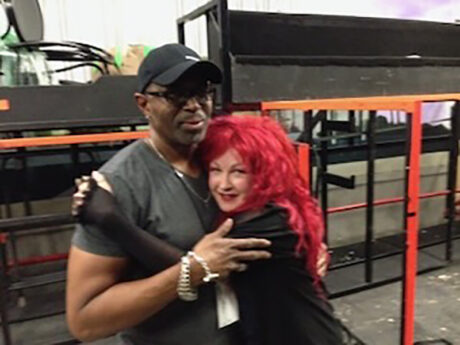
The Big Promotion
In 2001, when Jackson was going back out, Davies would ask Weldon to be the production manager for it. “That was a lot of faith,” Weldon says, shaking his head as if he still can’t believe it. “So, I rolled with it, and it all started from there.” It was a roll indeed: When that tour ended, he worked with Cher. From that he took a hard turn with the Eagles. Asked about that experience, Weldon chuckles, “God bless them — Don [Henley] and Glenn [Frey] take no prisoners. If you can survive that, you can survive anything. It was funny because I was wanting to do a rock band and… well, be careful what you wish for!” That 2005 tour was supposed to be a short run but it kept being extended.
Weldon would finally leave to head up the first Cirque du Soleil arena tour, Delirium, which ran from 2006 to 2007. “That led me to Las Vegas at Caesar’s where I brought in Cher and Bette Midler residencies back-to-back.” There would be a break when Elton John came in to do a run, and then another cycle of Cher and Midler. “That went on for three years.”
In 2008, Davies called to tell him Turner was coming out of retirement for a world tour. “Tina is by far one of the best people I’ve ever worked for in my life because she is such a gracious, loving human being. You would think because of all her life’s hardships she would be the opposite of that.” He tells of how after every show, no matter how tired she was, even if she didn’t feel well, she always went to the crew members asking how they were doing. “An amazing lady. I miss her very much.”
It’s not unusual for an artist to gift a memento of some kind to a long-time crew member, but it would be hard to top what Turner gave Weldon: a new knee. “One day I was loading in, and her personal security guard told me she wanted to talk to me. As in ‘the Duchess wants to see you right away.’” He went into her dressing room, and Turner’s stern tone begat thoughts of “what did I do now?” “You’ve been hobbling around here for weeks,” she pointed out, demanding to know what was wrong. Weldon mentioned his knee was acting up, but he was fine. “Shut up,” she said. “This is what you’re going to do.” Doctors’ appointments, surgery, and physical therapy ensued, with Turner picking up the tab. He’s still grateful, as you’ll see if you ever receive an email from him, as his signature declares, “Just An Old Guy with New Knees Pushing Boxes!!!”

The Best People
Weldon next worked with Mariah Carey and then took care of what would be Whitney Houston’s last tour. Then, likely topping the Eagles’ reputation for, as they say in this biz delicately, ‘perfectionism,’ he worked with Prince. “He was by far the best entertainer I’ve ever seen. But very, very difficult. When he asks for something, he did not realize, or know, or care, how long it took for you to make it happen. Right away he’d go, ‘well where is it?’” But understanding that “his brain worked a bit differently than the rest of us,” Weldon would forgive all when Prince took the stage. “He would play the guitar with one hand and the piano with the other and be dancing at the same time — just stunning. It almost pissed you off more because you realized how good he was and so whatever he was asking for, there was a good reason for it. He wanted to prove to you that no matter how good you thought you were at something, he was better. Because he was.”
In 2017, Davies called Weldon for a meeting. “He sat me down and showed me Pink’s tour schedule. I looked and said, ‘Oh that’s nice,’ trying to figure out what was going on.” It was in fact a great schedule, and in this business, that means multiple dates in a single city. Pink is especially big in Australia, and those many shows in a single arena caught his eye — 13 in Melbourne alone. Finally, Davies asked him if he was interested in being production manager on the tour. He’s been with Pink exclusively ever since.
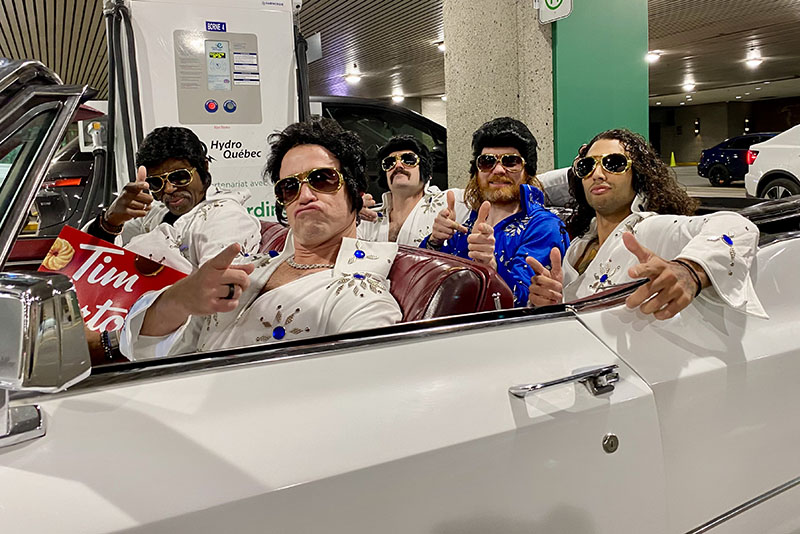
Pink’s shows are even more complicated than the typical mega-star arena tour due to the amount of acrobatics she does. “And it’s all her — she does not use a track, and that is her singing upside down while flying over the crowd.” But his approach to his job hasn’t changed: “The trick is to get the best people,” he says. “A production manager is only as good as the people that he surrounds himself with. Next, give those best people the tools they need to get the job done.” He cites head rigger Gabe Wood, “one of the best in the business,” as someone with enormous responsibility taking care of her many flying gags. “He steers a lot of it, and it’s because of him that Pink is up there with the greatest entertainers, doing things that nobody else can do.” And once, during setup, Weldon got in on the fun himself and flew over a stadium. In recent years he’s also gone out in support of Stevie Nicks, Bad Bunny and Eric Church. But he takes care of every Pink tour.
Weldon is like a great artist himself in the sense of making it all look easy — even with this most recent tour, a 39-truck one. “I got the bigger picture in mind.” He then cites another Lifetime Honoree Jake Berry (Rolling Stones, U2) as an inspiration. “I don’t know how he can keep all that knowledge in his head, but he knows a little bit about everything.” He also acknowledges other great production managers who have had this honor including Benny Collins (Michael Jackson) and Bobby “Boomer” Thrasher (Billy Joel). “Boomer is another big mentor to me — no matter what is happening, he’s always even-keeled.” Watching Weldon work, it’s clear he’s certainly emulating that crucial skill. Weldon is now also a mentor to many, and often spotted on educational industry panels, including a recent one at THE Conference: Live at Lititz, where he’s on the advisory board.
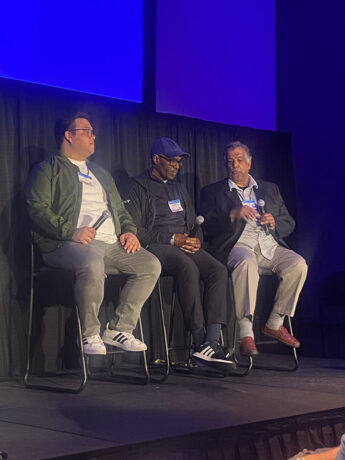
Besides those formal opportunities which he relishes, he helps others as much as he can through words and deeds. “You’re only as good as your last gig,” he tells others. “You want to shine as brightly as possible so that someone sees you and wants to work with you.” Another admirable but not always prevalent aspect to Weldon is how profoundly grateful he is. “I’m incredibly blessed to have this job. I’ve been doing this for almost 40 years, and I’m still amazed when a guitar player plugs into his amp and he and the other musicians conjure up whatever is in their heads to make this beautiful sound. I would not like sitting behind a desk in a cubical, hating to go to work every day; not to say I always have good days, but the good days outweigh the bad.” At this point, he has done well enough that he could “easily walk away,” but adds that he’s “worked with some of the best people in this business, and I’m going to keep doing it until I’m done, or win the lottery.”
“People who have been doing this a long time will tell young people trying to get into the business that it’s about having a great work ethic and a great attitude,” Hom adds. “Malcolm always had those qualities, and then he put his head down and did the work and made it clear he was happy to be there. Those qualities and more still shine through him today.”
Equally impressive is his stable family life, not always that common to one who makes their living from being on the road. He lives with wife Laverne and three dogs and is proud of his two children. Nicolas is a handheld camera op and video director, and Camille has a degree in clinical psychology but more recently has become a DJ.
As far as receiving the Parnelli Award, “I’m blown away by it. I would have never thought my name would come up for this. I don’t even think in those terms. All the others that have received this before me… I’m still flabbergasted, and now, having to talk about myself—it’s kind of weird to me. That’s not something you ever think about,” Weldon says about receiving the industry’s highest honor. “You don’t think you’ll get a surprise like this, not in a million years.”
“What makes a good production manager? It’s all about the people in the crew,” Hom says. “That’s where Malcolm really excels. He is concerned about the people he takes on tour, always looking out for them, concerned about their well-being. That’s what makes him so great.”
